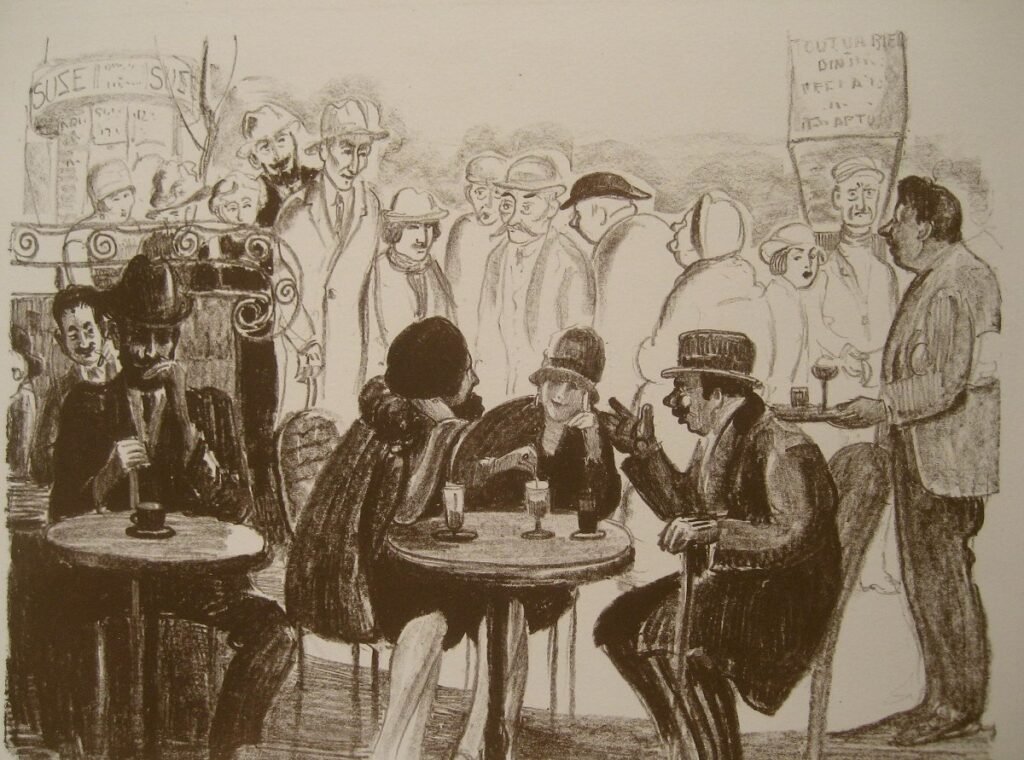The Great War (the first of two massive global conflicts) left notable scars on our world, reshaping the international balance of power and leaving behind much debt and devastation. As the world began its recovery from the destruction wrought during the war, veterans and youngsters affected by the wars found their artistic output drastically different from that of their predecessors. A term coined by Gertrude Stein, the label “Lost Generation” became used to describe a generation of literary output created by those who came of age during the Great War. This article explores the tendencies and themes of Lost Generation literature and highlights some of the lives and connections between the authors of those works.
The usage of the word “lost” can have multiple meanings. Some sources argue it refers to the disillusionment, hopelessness, and uncertain values that seemed to characterize the new generation. Many lost generation writers were also physically displaced, intentionally. Most were expatriates who associated in a circle within Paris surrounding Gertrude Stein, feeling held back by the limits of American or English society as opposed to the freedoms of Paris. Moreover, some writers of the generation, including Hemingway quite notably, served in the Great War and were able to incorporate their wartime experiences into their work. For Whom the Bell Tolls is a renowned example of this trend. Another key feature that makes Lost Generation writing “lost” is the experimental writing techniques and sense of bleakness that featured prominently in many significant works of the movement, including The Sun Also Rises by Ernest Hemingway and Tender Buttons by Gertrude Stein.
Despite common ground between the Lost Generation writers, various clashes and differing subject matters separated them. One such rift between the two writers of this period was between Hemingway and Stein. Growing disinterested in Stein’s perceived arrogance and laziness and her comments against him, Hemingway began to distance himself from her. Though he notably used her quote establishing the Lost Generation as an epitaph, critics argue that he used it to disprove her point as his novels continued to reflect the ongoing presence of solid values in the young generation. Though later on, Hemingway and F. Scott Fitzgerald cemented their reputations as great American writers with widely-read and applauded books, Stein’s writing was considered dense and impenetrable, causing her to become one of the least-read writers of the generation. However, Stein is still read and acknowledged as one of the most significant figures of the Lost Generation. Other poets and writers of the time were less fortunate. Zelda Fitzgerald, wife to F. Scott Fitzgerald and a writer herself, stopped writing upon marrying her husband due to his request. Continued disdain for her by her husband’s friends, notably Hemingway, pushed her further toward the mental health issues that would later consume her.
Ultimately, the Lost Generation of literature was heavily shaped by the Great War, and the themes of its literature and the complicated lives of its creators give meaning to the name of the generation. Nonetheless, through a tumultuous period, the art and literature of the Lost Generation’s time set the groundwork for the modern time and culture we live in today.
Works Cited
Baldwin, Emma. “Lost Generation.” Poem Analysis, poemanalysis.com/movement/lost-generation/.
Chatila, Amanda. “The Lost Generation and Millennials | Looking Glass.” Hfcc.edu, 2017, glass.hfcc.edu/2017/05-01/lost-generation-and-millennials.
Dent, Catherine. “What Was the Lost Generation? (and Is This Term a Misnomer?).” The Collector, 8 Apr. 2023, www.thecollector.com/what-was-the-lost-generation/. Accessed 17 Mar. 2024.
Morton, Sunny Jane. “The Lost Generation: Who They Are and Where the Name Came From.” FamilySearch Blog, 7 Apr. 2020, www.familysearch.org/en/blog/who-is-the-lost-generation.
Pound, Cath. “The Shocking Memoir of the ‘Lost Generation.’” Www.bbc.com, 26 July 2021, www.bbc.com/culture/article/20210726-the-scandalous-memoir-of-the-lost-generation.
The Editors of Encyclopedia Britannica. “Lost Generation | Definition, Members, & Origin.” Encyclopædia Britannica, 15 May 2017, www.britannica.com/topic/Lost-Generation.
